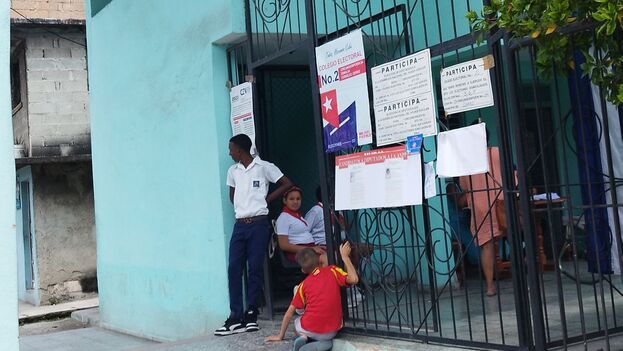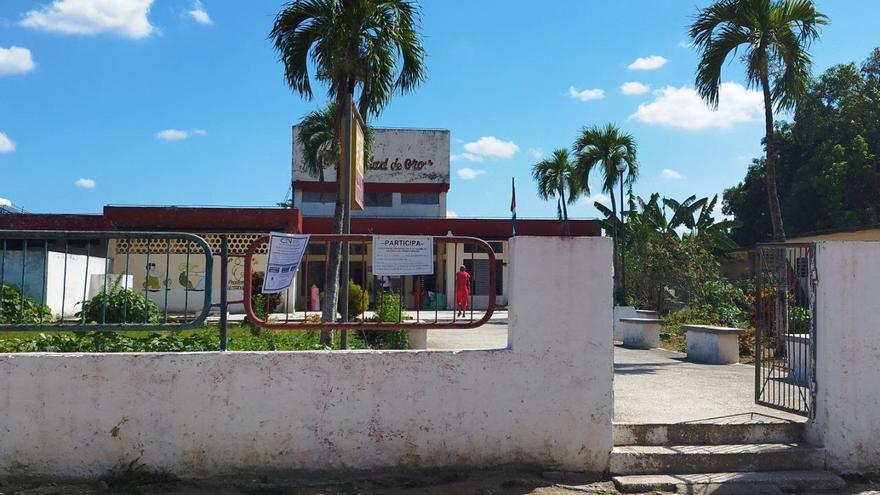
![]() 14ymedio, Havana, 27 March 2023 — A lack of enthusiasm marked Cuba’s parliamentary elections on Sunday, March 26, which even with the official data available so far already point to the lowest turnout since 1959. The 14ymedio team was able to verify in different polling stations in Havana that not many Cubans came to vote. In the provinces, where it is more complex to be recognized as having abstained, greater encouragement was noticed.
14ymedio, Havana, 27 March 2023 — A lack of enthusiasm marked Cuba’s parliamentary elections on Sunday, March 26, which even with the official data available so far already point to the lowest turnout since 1959. The 14ymedio team was able to verify in different polling stations in Havana that not many Cubans came to vote. In the provinces, where it is more complex to be recognized as having abstained, greater encouragement was noticed.
The low attendance is confirmed by collaborators of this newspaper in different provinces and is also suggested by the coverage of the official press, which has not been able to show photos of voters standing in line. The newspaper of the Communist Party of Cuba, Granma, has been inaccessible since the closing of the polls.
According to official data, by five in the afternoon, 70.34% of the electoral census had voted, which is 8.23 points less than in the 2018 elections, which had the least participation at the time. Alina Balseiro, the president of the National Electoral Council (CEN), is expected to appear this Monday to give the first definitive data.
The polls remained open two more hours until 7 p.m., since the CEN extended the deadline by one hour without further explanation. Manuel Cuesta Morúa was one of the opponents who said that the extension was “without causes of force majeure,” as happened in the referendum for the Family Code, held a few days after the passage of Hurricane Ian.
The opponent also questioned the growth of participation between 9:00 and 11:00, when the jump went from 18.15% to 41.66%. The official data of the 2018 elections reflect the same trend, but it was not the case in the municipal elections of 2022, when fewer people voted in the time slot from 9:00 to 11:00 than in the time slot from 7:00 to 9:00. In 2018, the campaign in favor of abstention was not as intense as in this last election, but, nevertheless, the regime now presents higher attendance data.
The lack of international observation missions was one of the biggest criticisms of the opposition and different NGOs, such as Electoral Transparency. “The results issued by the National Electoral Council cannot be disputed” and go in the opposite direction “of the abstentionist trend that the CEN itself reflected” in past elections, the organization said in statements to the Spanish news agency EFE.
Electoral Transparency called for “an independent audit so that the announced results are reliable.”
Despite everything, even the official data do not point in a good direction for officialdom, which has turned more than ever to trying to activate the vote. Participation in the parliamentary elections on the Island has been historically high. Between 1976 and 2013 it was always above 90%, and only in 2018 did it fall for the first time below that barrier, to 85.65%, even though the campaign for abstention was not as active and mobilized as it was this time.
In comparison, the abstention in last year’s voting in Cuba was greater than what the CEN offered at 5:00 p.m. In last November’s municipal elections it reached 31%, and in the referendum on the Family Code held in September it stood at 26%.
The authorities have stressed that voting participation on the Island is much greater than that of countless elections in Western democracies, starting with the United States itself. However, the Cuban government knows the peculiarities of its own system and knows that it can only compare to itself, so the decrease in voters who go to the polls is bad news that is difficult to hide.

Last Thursday, in the propaganda program Con Filo [Cutting Edge] on Cuban television, the presenter himself explained it as follows: “The suffrage in Cuba has a double significance: not only are future deputies elected to the National Assembly but, as in every election, our political system is subjected to a tacit referendum. That’s how we see it and that’s how our enemies see it.” Abstention and null or void votes will be fundamental in analyzing the loss of support for the Revolution on the part of Cubans.
The NGO Cubalex, in addition, pointed out this Sunday different acts of repression against independent journalists and opponents who tried to exercise observation tasks in the elections. By 9:00 p.m. it had identified 27 cases, with about 30 affected.
In this Sunday’s elections, 470 candidates were presented for the same number of seats, almost all of them militants of the PCC, the youth organizations and others related to the government. The authorities urged a block vote for all the candidates proposed by each district in messages reproduced in a loop in the state media and disseminated with the hashtag #YoVotoXTodos.
On the ballot, voters could put an “x” in the box for all the candidates (following the official call), or imply next to some of the names, or even leave the ballot blank.
This call for a “united vote” led the most fervent followers of the Government to vote for unknown candidates from their district.
“We don’t know all the candidates, but we voted for the Revolution,” Rafaela, a 67-year-old Cuban near the polling station in Havana, told EFE.
That age group was one of the few still relatively mobilized, according to the information collected by 14ymedio in the previous days. Young people are, again, the ones who expressed the most disinterest, either because of their perception that the Revolution doesn’t belong to them, or because their only thought is to leave an Island that is in a worse condition than ever.
The progressive fall in participation since 2018 has been read by the Government as a response to the economic crisis. The president himself, Miguel Díaz-Canel, went so far as to speak of a “punishment vote” during the referendum on the Family Code.
After voting, the president dismissed the possibility that abstention will continue to gain ground in elections: “I don’t think so, because this hasn’t been the only moment with difficulties and economic complexities.”
The Minister of Foreign Affairs, Bruno Rodríguez, expressed himself in the same way in statements to the press at a polling place in Havana: “Cuban elections will continue to be different in the sense of greater participation and democracy than the majority you see on the planet.”
Translated by Regina Anavy
____________
COLLABORATE WITH OUR WORK: The 14ymedio team is committed to practicing serious journalism that reflects Cuba’s reality in all its depth. Thank you for joining us on this long journey. We invite you to continue supporting us by becoming a member of 14ymedio now. Together we can continue transforming journalism in Cuba.
